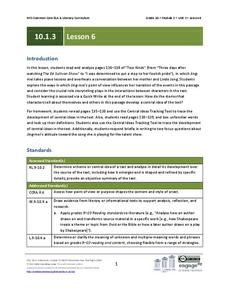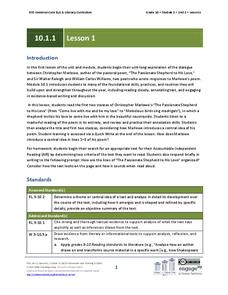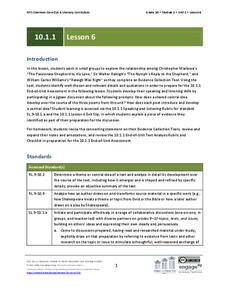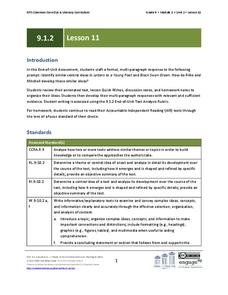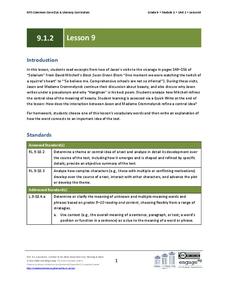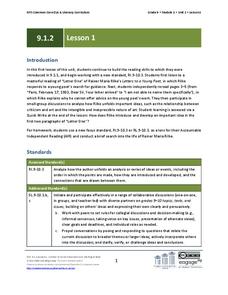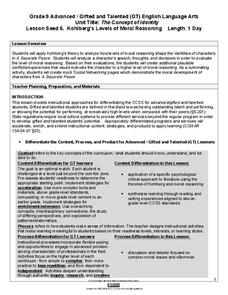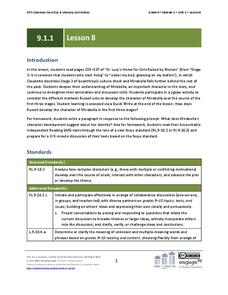EngageNY
Grade 10 ELA Module 1: Unit 3, Lesson 8
Prepare for a mid-unit assessment based on Amy Tan's The Joy Luck Club with a brainstorming and discussion lesson plan. Focused on two chapters from the novel ("Rules of the Game" and "Two Kinds"), the lesson plan guides tenth graders...
EngageNY
Grade 10 ELA Module 1: Unit 3, Lesson 6
Amy Tan's The Joy Luck Club brings together the central ideas of identity, ambition, expectations, and relationships. As high schoolers read an excerpt from the chapter "Two Kinds," they note how Jing-Mei's connection to music relates to...
EngageNY
Grade 10 ELA Module 1: Unit 3, Lesson 3
Few studies have captured the complex relationships between mothers and daughters, such as Amy Tan's The Joy Luck Club. Tenth graders read "Rules of the Game," which describes Waverly's youth in chess tournaments, and compare how she...
EngageNY
Grade 10 ELA Module 1: Unit 3, Lesson 2
Sometimes, sensory details can bring you back to a familiar place. Study the setting descriptions from a critical chapter in Amy Tan's A Joy Luck Club, and discuss how they enhance the book's plot and contribute to a central theme.
EngageNY
Grade 10 ELA Module 1: Unit 1, Lesson 7
Can three works of literature work together to establish and develop a common central idea? Put your thoughts into writing with a final assessment focused on a unit-long analysis of Christopher Marlowe's "The Passionate Shepard to His...
EngageNY
Grade 10 ELA Module 1: Unit 1, Lesson 4
Guide high schoolers through the most successful and efficient ways to address a text with a literary analysis instructional activity. As learners find examples of alliteration in Christopher Marlowe's "The Passionate Shepard to His...
EngageNY
Grade 10 ELA Module 1: Unit 1, Lesson 2
If you only read a poem once, you'll miss many levels of analysis and comprehension. High schoolers finish reading "The Passionate Shepard to His Love" by Christopher Marlowe and discuss how the poem's organization contributes to its...
EngageNY
Grade 10 ELA Module 1: Unit 1, Lesson 1
Can authors speak to each other across works, genres, and centuries? Study the conversation between Christopher Marlowe in his poem "The Passionate Shepherd to His Love" and the responses by Sir Walter Raleigh and William Carlos Williams...
EngageNY
Grade 10 ELA Module 1: Unit 1, Lesson 5
If you've ever wished you could respond to an author's message, an instructional activity that connects three poems with the same concept will appeal to you. Based on the first few lessons' focus on Christopher Marlowe's "The Passionate...
EngageNY
Grade 10 ELA Module 1: Unit 1, Lesson 6
Wrap up your literary analysis unit with a discussion activity as tenth graders prepare for an end-of-unit assessment. After they have read and annotated Christopher Marlowe's "The Passionate Shepard to His Love," Sir Walter Raleigh's...
EngageNY
Grade 9 ELA Module 1, Unit 2, Lesson 11
As an end-of-unit assessment, class members craft a formal, multi-paragraph essay identifying a similar idea found in Rainer Maria Rilke's collection, Letters to a Young Poet, and David Mitchell's Black Swan Green. Writers state and use...
EngageNY
Grade 9 ELA Module 1, Unit 2, Lesson 8
What is the source and meaning of beauty? As part of their reading of David Mitchell's Black Swan Green, class members analyze Madame Crommelynck's conversation with Jason to determine how the conversation about beauty develops a central...
EngageNY
Grade 9 ELA Module 1, Unit 2, Lesson 9
Class members continue their discussion of David Mitchell's Black Swan Green, focusing on how the author uses the conversation between Jason and Madame Crommelynck to refine his central idea of the meaning of beauty.
EngageNY
Grade 9 ELA Module 1, Unit 2, Lesson 6
Guided by the provided questions, readers of David Mitchell's "Hangman" examine the author's figurative language to develop the constant struggle in Jason and Hangman's relationship.
EngageNY
Grade 9 ELA Module 1, Unit 2, Lesson 1
Where does a writer find inspiration? "Go into yourself," says Rainer Maria Rilke in "Letter One" from Letters to a Young Poet. Readers of Rilke's letter to Franz Xaver Kappus examine the words and figurative language Rilke uses to...
Maryland Department of Education
The Concept of Diversity in World Literature Lesson 10: Author's Purpose Seminar
Why did Chinua Achebe write "An Image of Africa: Racism in Conrad's Heart of Darkness" in response to Conrad's novel? As part of a study of Things Fall Apart, class members conduct a socratic seminar focused on Achebe's purpose and...
Maryland Department of Education
The Concept of Diversity in World Literature Lesson 9: Debating Imperialism
To gain an understanding of Imperialism, class members read Rudyard Kipling's poem, "The White Man's Burden" and Mark Twain's essay, "To the Person Sitting in Darkness." Groups compare these perceptions of non-white cultures with the...
Maryland Department of Education
The Concept of Diversity in World Literature Lesson 8: Nonfiction Close Reading
As part of their study of Things Fall Apart, class members conduct a close reading of a section of Chinua Achebe's essay, "An Image of Africa: Racism in Conrad's Heart of Darkness." Jigsaw groups then compare the voice in the essay...
Maryland Department of Education
The Concept of Diversity in World Literature Lesson 1: Unit Introduction
To launch a unit study of the concept of diversity in World Literature, class members compare Chinua Achebe's essay, "An Image of Africa: Racism in Conrad's Heart of Darkness" and Richard Rodriguez's essay, "The Chinese in All of Us: A...
Maryland Department of Education
The Concept of Identity Lesson 6: Kohlberg's Levels of Moral Reasoning
How does our moral reasoning shape our identity? After a study of Kohlberg's Levels of Moral Reasoning, readers use Kohlberg's theories to analyze the speech, thoughts, and decisions of a character in A Separate Peace. They then create...
EngageNY
Grade 9 ELA Module 1, Unit 1, Lesson 13
Finish Karen Russell's "St. Lucy's Home for Girls Raised by Wolves" with an instructional activity focusing on the story's conclusion. After participating in literary analysis discussions with small groups, ninth graders complete a Quick...
EngageNY
Grade 9 ELA Module 1, Unit 1, Lesson 9
Find the central idea in an excerpt from Karen Russell's "St. Lucy's Home for Girls Raised by Wolves" with a literary analysis lesson. As your class analyzes a section of the story, they determine how the author forms the central idea...
EngageNY
Grade 9 ELA Module 1, Unit 1, Lesson 8
You can often track a character's development based on others' reactions to their words or actions. Using Karen Russell's "St. Lucy's Home for Girls Raised by Wolves," ninth graders work in a jigsaw activity to analyze how Mirabella's...
EngageNY
Grade 9 ELA Module 1, Unit 1, Lesson 5
Finding the central idea in a text is equally important in fiction and nonfiction. Work on analyzing a piece of writing for the central idea with Karen Russell's "St. Lucy's Home for Girls Raised by Wolves," complete with supporting...



